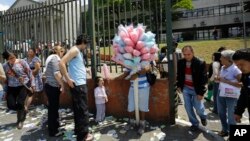Brazil’s Workers' Party - PT - lost big Sunday when Brazilians voted in the first local elections since Dilma Rousseff’s impeachment.
Brazilians in 5,568 municipalities voted for mayors and city councils. Rousseff's PT suffered a major defeat in the country’s biggest city, Sao Paulo.
“It was a very hard defeat for the Workers’ Party. … The question is how hard it would it be [and] it was very hard,” Michael Mohallem, a political expert at the Getulio Vargas Foundation, told AFP.
Local reports say Brazilians want change as they continue to struggle during one of the country's worst recessions and aftermath of the Petrobras scandal; the state-run oil company at the center of a sprawling political kickback scheme.
PT also has no presidential alternatives, according to experts. The Brazilian Senate voted to remove Rousseff from the presidency for pedaladas fiscais - the practice of using public money to fund state or federal social programs without the approval of Congress.
“The [PT] party made a lot of mistakes in recent years and never admitted it was wrong,” said Claudio Couto, a political scientist at the FGV think tank in Sao Paulo.
In Sao Paulo, a city that usually brings recognition to politicians at a national level, incumbent Workers’ Party candidate Fernando Haddad received just 16 percent of the vote. Joao Doria from PSDB - the millionaire businessman who was leading the campaign from the beginning - received 53 percent.
In an interview with Globonews, Doria said he will work hard for Sao Paulo while being righteous and honest.
Doria said his administration will have a productive relationship with the Municipal Council, adding that low income neighborhoods need a mayor who is present.
"I always believed this could happen, even when I started with 3 percent in the polls … Expect me to be a good manager. It is possible to make policy without being a politician. I beat a lot of politicians in this election,” the mayor-elect said at a news conference.
Doria is also the former host of The Apprentice Brazil and campaigned with the slogan "I'm not a politician, I'm a businessman."
This is the first election since the country’s Supreme Court banned corporate financing in order to clean up politics and steer officials away from corruption.
Reports say the new rule, however, helped wealthy businessmen and candidates who received support from evangelical churches.
"Ending corporate donations has, in fact, favored rich candidates who have their own resources," Supreme Court Justice Gilmar Mendes, who heads Brazil's top electoral authority, told Reuters.
Wealthy candidates are now allowed to donate up to 10 percent of their declared income to their own campaign.
Doria funded half of his campaign from his own pocket, giving $914,000.
Rio de Janeiro - Brazil's second-largest city - will need a runoff to decide the next mayor. Senator Marcello Crivella, who finished first with 27 percent of the vote, will face Marcelo Freixo, who received nearly 19 percent. President Michel Temer's party candidate finished third.
Candidates in Brazil must receive more than 50 percent of the votes to avoid a runoff.





